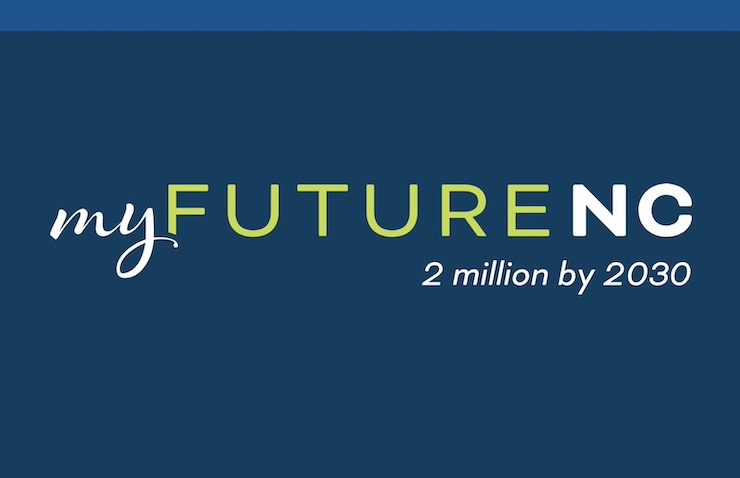Zipline and MyFutureNC are Shaping Education and Careers in the Drone Industry

As of 2022, North Carolina was ranked 38th in the nation for postsecondary education enrollment. In 2019, after nearly two years of working with government, academic, and private organizations to develop a program to address North Carolina’s decreasing postsecondary education numbers, myFutureNC was established. As explained on their website, “myFutureNC promotes a shared vision for an education-to-workforce continuum across North Carolina—from early childhood through adulthood—and aligns and supports local, regional, and state actions that will dramatically increase attainment of industry-valued credentials and postsecondary degrees.” myFutureNC has stated that by 2030, they aim to see 2 million North Carolina students reach their full potential with postsecondary educational enrollment.
The North Carolina Department of Public Instruction (NCDPI) plays an important role in helping myFutureNC reach this goal. As the stewards of 2,741 K-12 public schools with approximately 1,430,000 students, the NCDPI is directly responsible for developing the educational frameworks that will prepare students for postsecondary education. In the summer of 2024, the NCDPI announced a new program designed to prepare its students for a career outside of high school, whether that be in the workforce or by continuing their education. This program is a partnership with the world’s leading drone delivery company, Zipline.
Zipline was founded in 2014 by Keller Rinaudo Clifton, Keenan Wyrobek, Ryan Oksenhorn, and William Hetzler. Based out of Half Moon Bay, California, Zipline developed a drone delivery program to assist people in need. The team designed and developed a drone system to safely deliver medical supplies to remote locations. They signed a deal with the Rwandan government to build and test a drone distribution center in 2016. The success of this medical drone distribution center led to Zipline establishing similar locations throughout Rwanda, Kenya, Ghana, Côte d’Ivoire, and Nigeria. These drones ensured that people in remote regions had access to blood, vaccines, medications, and medical supplies that would otherwise require days of travel.
“Rural healthcare is a challenge in every country in the world, including in the United States,” Keller said. “You now see much bigger and wealthier countries like the US using Rwanda as a role model.” In 2020, Zipline entered a partnership with the Federal Aviation Administration (FAA) to begin trials of their medical drone delivery systems in North Carolina. During the height of the coronavirus pandemic, Zipline played a pivotal role in providing North Carolina medical teams and residents with access to vaccines, PPEs, and other necessities. By 2023, the FAA had granted Zipline a waiver to allow BVLOS (Beyond Visual Line of Sight) operations, further enhancing the company’s drone delivery capabilities. Later that year, Zipline announced that they had made their one millionth vaccine delivery via drone services.
Today, Zipline is the largest drone delivery company in the world, having expanded beyond medical deliveries. “Zipline is on a mission to build the world’s first logistics system that serves all people equally,” the company website states. “With operations in eight countries across four continents and more than 80 million commercial autonomous miles flown to date, Zipline is transforming access to healthcare, consumer products, and food.” Now, in this partnership with the NCDPI, Zipline is set to embrace the future of drone engineers and pilots.
The program is slated to begin in the 2024-2025 school year. Qualifying students from 60 North Carolina high schools will have the opportunity to study the fundamentals of the drone industry. This encompasses everything from FAA regulations to drone development, repair, flight, and various industry applications. At the end of the program, students will be guaranteed an interview with Zipline for employment. For those who do not accept a position with Zipline, the NCDPI hopes they will be better prepared and encouraged to take the skills they learned through the drone program into a postsecondary educational path.
“The goal of Career and Technical Education in North Carolina is to open doors to successful and fulfilling careers for our students through exposure and helping them develop academic, technical, and durable skills to use in the workplace,” said Tyre Michael, director of Career and Technical Education for the NCDPI. “This partnership prepares students for a viable career after graduation in a field that is rapidly expanding globally.” By integrating advanced drone technology into the educational framework, North Carolina is not only addressing its postsecondary enrollment challenges but also preparing its students for thriving careers in a rapidly evolving industry. With these efforts, North Carolina is poised to inspire and empower the next generation of leaders and innovators in the global marketplace.
|